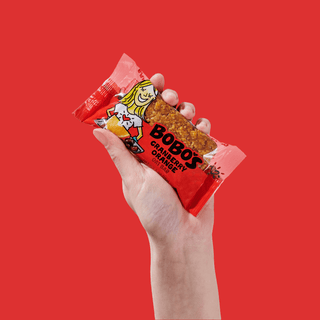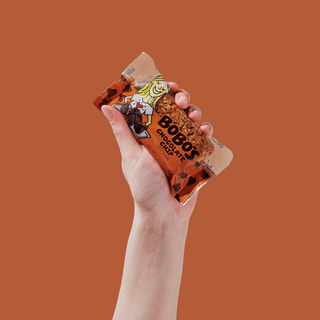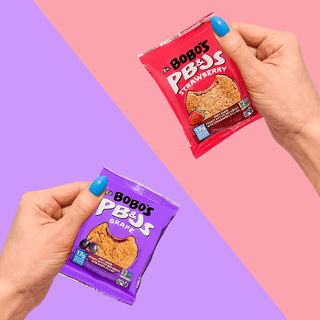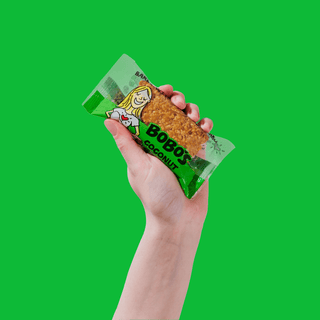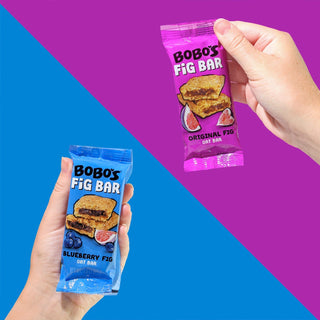Made with:
By Emma Caplan-Fisher
If you've noticed your stomach doesn't feel quite right on a regular basis, you might be dealing with gut sensitivity, which can result from any number of health issues. Whether it's relieving bloating, nausea, gas, or other symptoms, you can help yourself by eating foods that are gentle on the stomach and won't exacerbate that discomfort you're feeling.
Keep reading to learn about common digestive issues and symptoms of a sensitive stomach, along with ideal types of foods and the best snacks for sensitive stomachs, including recipes.
Common digestive issues
Experiencing a sensitive stomach is quite common, with millions of people affected by many diseases and ailments causing it. These include, for example, irritable bowel syndrome (IBS), acid reflux, food allergies and intolerances, celiac disease, and even the common stomach flu.
The International Foundation for Gastrointestinal Disorders finds that IBS — a long-term chronic condition affecting the stomach and intestines that often comes with cramping, abdominal pain, bloating, gas, diarrhea, and/or constipation — impacts up to 45 million U.S. residents.
Acid reflux occurs when acid from what you ingest flows back upward from the stomach into the esophagus and throat. Acid irritates and inflames tissues in the esophagus, resulting in feelings of indigestion or heartburn. While it's often occasional, chronic acid reflux can damage these tissues.
The Asthma and Allergy Foundation of America notes about 20 million people in the U.S. deal with food allergies or intolerances. These can range from less severe intolerances causing indigestion of certain ingredients that make us feel sick, to an abnormal immune response to food with a wide range of symptoms — like itchiness, tongue swelling, vomiting, diarrhea, hives, breathing issues, or low blood pressure.
Celiac disease is caused by an immune reaction to gluten (a protein found in wheat, barley, and rye) that, over time, can damage the small intestine lining and prevent it from absorbing nutrients. Symptoms can include fatigue, diarrhea, bloating, weight loss, or anemia. The National Institutes of Health finds about two million Americans suffer from celiac disease.
Finally, there are acute problems. For example, an infection from the norovirus, one of many viruses that cause the common stomach flu, can bring on nausea and stomach pain. This particular virus affects about 685 million people each year.
If you're dealing with any of the symptoms that these or other diseases and digestive issues cause, you'll want to choose your snacks wisely. Some ingredients (which we'll get into next) can alleviate or exacerbate the pain or discomfort you might be experiencing.
Symptoms of sensitive stomachs
Most people will experience stomach sensitivity or digestive issues throughout their lives, so it can be helpful to know what symptoms to watch out for. Common ones include:
- Nausea
- Bloating
- Gas
- Cramping
- Stomach pain
- Vomiting
- Diarrhea
- Constipation
- Indigestion
- Heartburn
- Acid reflux
If you're experiencing one or more of these symptoms more than once in a while, or other, more debilitating symptoms come up, it's best to speak with your doctor or healthcare practitioner. They can help you find out what's going on and whether it's indicative of a serious underlying issue.
Best foods for sensitive stomachs
Here are some ideal food types to stick to when you're dealing with a sensitive stomach.
Fermented foods
Thanks to the probiotics they offer from live bacteria, fermented foods like kimchi (which usually contains cabbage) are great for balancing the gut microbiome, which helps to improve digestion. Yogurt, miso, and kombucha are other great choices.
Still water and herbal teas
Ginger and peppermint tea have been found to help settle an upset stomach, as has staying hydrated. While water is certainly the best option, herbal teas help too since you're getting mostly water with them. Furthermore, their ingredients can help to relieve nausea and decrease bloating.
Fruit
Fiber can help with digestion, including from fruits like pears and apples especially when cooked, as they break down fiber. This is thanks to their pectin, which encourages good bacteria growth in the colon.
As well, pears, along with dates and prunes, can help with constipation. However, if you're dealing with IBS you might be better off with bananas (also helpful to relieve diarrhea), oranges, grapes, or strawberries, as these fruits don't contain the same types of sugars that can cause issues in the intestine. Prebiotic foods like bananas are known to be gentle on the stomach.
Kefir
A fermented, probiotic-rich yogurt-like beverage, kefir contains about 12 active probiotic strains that can help the gut and possibly even improve its bacteria for those with inflammatory bowel disease.
Cooked vegetables
Raw vegetables, particularly cruciferous vegetables like Brussels sprouts, are harder to digest than their cooked counterparts, but steaming is a simple, healthy, and tasty cooking method. You can also try sweet potatoes, carrots, squash, green beans, eggplant, or zucchini.
Clear broth
A light, simple clear broth can help settle inflammation and is an easy-to-digest, gut-supporting food that can soothe the stomach and relieve upset.
Bread and oatmeal
Bread (plain white or wheat) quickly breaks down into glucose and is gentle on the stomach and easily digested, while oatmeal is a great source of soluble fiber that helps to slow digestion and keep you full.
Our favorite snacks for sensitive stomachs
Here are some quick and easy-to-fix snacks for sensitive stomachs.
Oat bars. Bobos makes plenty of snack options suitable for those with a sensitive stomach. For example, our Oat Bars contain whole oats, which are gentle on the stomach and contain soluble fiber that helps to slow digestion and keep you full.
Plus, being one of many great low FODMAP snack foods, they come in flavors made with ingredients suited to those with gastrointestinal disorders like IBS. These flavors include original, chocolate chip, coconut, and lemon poppyseed, among others.
Saltine crackers. Plain crackers like saltines are gentle and a safe bet for any sensitive stomach symptoms.
Applesauce. Applesauce is easy to digest and gentle on the stomach. Look for something low in fiber with no added sugars.
Crystallized ginger. An anti-inflammatory herb that helps to ease nausea and settle the stomach, ginger is easy to chew and makes a simple, quick (and tasty) snack.
Vegetable broth. You can easily make your own vegetable broth or find one at your local grocer. This is a calming, easy-to-digest snack that will help you stay hydrated.
Rice cakes. Rice cakes are tasty, crunchy, and satisfying. Look for simple ingredients (like brown rice and sea salt) with low sugar and fiber.
Dried banana. Bananas are bland and easy to digest, and dried banana snacks will conveniently last a long time.
What makes foods reactive to sensitive stomachs
Some types of foods are naturally tougher for our bodies to process. They more easily cause inflammation, digestive issues, stomach discomfort or pain, and/or a host of other issues.
Among others, these include foods that are rich (i.e. those with high fat or dairy content, like cream sauces or ice cream), highly acidic (like tomatoes or coffee), fried or greasy (like burgers or French fries), and spicy (like curries or chili pepper).
Ingredients to look for and avoid
There is no single "best" food or ingredient to help a sensitive stomach, as what you should eat will most likely depend on your specific issue. First and foremost, that root issue is the most important thing to find out, with the help of your doctor or healthcare practitioner.
That said, these items are usually gentle on the stomach and can help with common symptoms like bloating, acid reflux, constipation, and more.
- Ginger, peppermint, and fennel
- High-fiber foods (like whole grains, fruits, and vegetables)
- Bananas, white rice, and applesauce
- Lean proteins and cooked vegetables
- Light, plain broth
Likewise, you're probably best off avoiding these difficult-to-process, inflammation or indigestion-triggering foods if you're struggling with stomach sensitivity:
- Fried foods
- Spicy foods
- Acidic foods
- Artificial sweeteners
- Caffeine
- Alcohol
Personalizing snack choices
When dealing with stomach sensitivity, no matter which snack foods you decide to try, some standard things can help along the way. This applies whether you have certain food allergies or sensitivities — which allergy-free snacks help with — or follow specific dietary restrictions like vegan, dairy-free, or others.
For one, choose something that's mild, easily digestible, and gentle on the stomach lining. As well, chew thoroughly, eat slowly, and try to serve yourself smaller portions (e.g. six small meals throughout the day instead of three larger meals). Finally, stay hydrated with plenty of still water during and in between meals.
Recipes for homemade stomach-friendly snacks
There are plenty of benefits when it comes to making your own homemade stomach-friendly snacks vs buying them ready-made.
For example, not only do you have much more creative license and freedom with the ingredients and preparation or cooking method, but you have total control over quality and flavor with the ability to tweak and improve recipes as you try them. Often, it costs less per serving to make something at home instead of buying the packaged version. Plus, since you'll be aware of every ingredient going into the snacks, you can control how nutritious they are (for instance, by reducing fat and salt content).
Try your hand at some of our favorite homemade snacks for sensitive stomachs:
Kefir or Greek yogurt smoothie
Use kefir or Greek yogurt as a base for smoothies, and add in any other digestion-friendly nutritious ingredients — like flax seeds, frozen berries, applesauce, or bananas. Toss everything in a blender, combine, and enjoy.
Apples and nut butter
Slice up an apple and spread some nut butter of choice onto each piece. Alternatively, you can dip slices into a dish of nut butter on the side.
Overnight oats
What's great about overnight oats is they can be made in bulk quantities, for a convenient snack to have on hand whenever hunger strikes. Combine ½ cup rolled oats or a crumbled-up Bobo’s bite, 1 tablespoon chia seeds, ¼ cup whole milk or Greek yogurt (optional), and ⅔ cup unsweetened almond milk. Add fruit and nuts of your choice, like sliced strawberries, blueberries, and/or almonds.
Roasted edamame
Preheat oven to 375°F and place one layer of edamame on a baking sheet. Lightly brush tops with olive oil and sea salt, then roast for 30 minutes, tossing occasionally.
Dark chocolate-covered strawberries
Wash and dry 8-10 strawberries, and line a baking sheet with parchment paper. Melt a few squares of dark chocolate in the microwave or double boiler. Dip strawberries in the melted chocolate, then lay them out on the baking sheet to cool until the chocolate has set.

